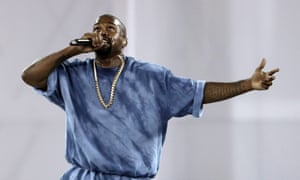
In the final shot of Kanye West’s video for his 2008 track Love Lockdown the rapper curls up into a foetal position in the middle of a bright white room, his head clutched desperately in his hands. It is a moment of vulnerability many might see as being at odds with the antagonistic, controversy-courting megastar, who declares himself a god, has snatched awards from the hands of Taylor Swift and makes dramatic outbursts on television chat shows.
Yet this week, as news broke of the singer’s hospitalisation in the psychiatric ward of UCLA, reportedly for stress and exhaustion following a week of erratic behaviour on stage and the subsequent cancellation of his tour, the pressures on hip-hop artists to conceal mental health vulnerabilities have come under almost unprecedented scrutiny.
West’s hospitalisation comes at a pivotal time for hip-hop’s complex relationship with mental health. Rather than distancing themselves from West’s possible mental health issues, fellow musicians such as Chance the Rapper, West’s recent collaborator, told the BBC he wanted to “extend a special prayer to my big brother Kanye West”.
Grammy-winning hip-hop producer 9th Wonder tweeted:These responses suggest attitudes, and stigmas, are changing. The macho and often adversarial culture of hip-hop, coupled with the fact that African American men are significantly less likely to seek help for mental health issues, has meant, in the public arena at least, it was rarely discussed.
That is not to say it has been ignored entirely. Dr Akeem Sule, a consultant psychiatrist, and Dr Becky Inkster, a clinical neuroscientist, both at the University of Cambridge, recently set up an initiative, Hip Hop Psych, after their academic research proved how much hip-hop lyrics can help people open up about their own mental health issues.
“We have to look to the origins of hip-hop to really understand how much mental health has always been at its core,” said Sule and Inkster.
“It developed in the mid 70s in the South Bronx, where gangs were roaming the streets, there was a drug epidemic, there was extreme poverty, a housing crisis. You throw in absent fathers, losing family to crime, people with no support; all those are ingredients for mental health problems.”
The pair pointed to songs such as Tupac Shakur’s So Many Tears, where he speaks about the impact his environment has on his own mental health and the struggles he has coping, as well as Geto Boys’ early-90s track Mind Playing Tricks on Me, which is widely acknowledged to be about psychosis.’); hiddenDoc.close(); })(); ![]() {“uid”:2,”hostPeerName”:”https://www.theguardian.com”,”initialGeometry”:”{\”windowCoords_t\”:36,\”windowCoords_r\”:1363,\”windowCoords_b\”:627,\”windowCoords_l\”:0,\”frameCoords_t\”:4226.0625,\”frameCoords_r\”:895,\”frameCoords_b\”:4476.0625,\”frameCoords_l\”:595,\”styleZIndex\”:\”auto\”,\”allowedExpansion_t\”:0,\”allowedExpansion_r\”:0,\”allowedExpansion_b\”:0,\”allowedExpansion_l\”:0,\”xInView\”:0,\”yInView\”:0}”,”permissions”:”{\”expandByOverlay\”:true,\”expandByPush\”:false,\”readCookie\”:false,\”writeCookie\”:false}”,”metadata”:”{\”shared\”:{\”sf_ver\”:\”1-0-5\”,\”ck_on\”:1,\”flash_ver\”:\”23.0.0\”}}”,”reportCreativeGeometry”:false,”isDifferentSourceWindow”:false}” scrolling=”no” marginwidth=”0″ marginheight=”0″ width=”300″ height=”250″ data-is-safeframe=”true” style=”border: 0px; vertical-align: bottom;”>
{“uid”:2,”hostPeerName”:”https://www.theguardian.com”,”initialGeometry”:”{\”windowCoords_t\”:36,\”windowCoords_r\”:1363,\”windowCoords_b\”:627,\”windowCoords_l\”:0,\”frameCoords_t\”:4226.0625,\”frameCoords_r\”:895,\”frameCoords_b\”:4476.0625,\”frameCoords_l\”:595,\”styleZIndex\”:\”auto\”,\”allowedExpansion_t\”:0,\”allowedExpansion_r\”:0,\”allowedExpansion_b\”:0,\”allowedExpansion_l\”:0,\”xInView\”:0,\”yInView\”:0}”,”permissions”:”{\”expandByOverlay\”:true,\”expandByPush\”:false,\”readCookie\”:false,\”writeCookie\”:false}”,”metadata”:”{\”shared\”:{\”sf_ver\”:\”1-0-5\”,\”ck_on\”:1,\”flash_ver\”:\”23.0.0\”}}”,”reportCreativeGeometry”:false,”isDifferentSourceWindow”:false}” scrolling=”no” marginwidth=”0″ marginheight=”0″ width=”300″ height=”250″ data-is-safeframe=”true” style=”border: 0px; vertical-align: bottom;”>
Charles Hamilton, a rapper who emerged to great acclaim in 2009, going on to collaborate with Eminem among others, very publicly unravelled and was later sectioned due to bipolar disorder. Returning to the public eye last year, he too spoke openly about his mental health issues.
“I just didn’t trust anybody. I didn’t leave my house, I just made music all the time. I was fighting depression, I shut myself in,” he admitted. “I wanted to commit career suicide, physical suicide, spiritual suicide, I didn’t care anymore.”
Yet for Inkster and Sule, the most significant figure breaking down this stigma around depression and revealing weakness is Kendrick Lamar. Arguably the world’s biggest hip-hop artist, they said Lamar’s public discussion of the inner demons and survivors’ guilt that fuelled his Grammy-winning album, To Pimp a Butterfly, have proved that depression is no longer perceived as a fallacy in the rap community.
“Back in the early days of hip-hop, that would never happen,” they said. “Yes, there are still braggadocio lyrics and attitudes but I would say hip-hop has made great strides.”
[Source:-THE GUARDIAN]



